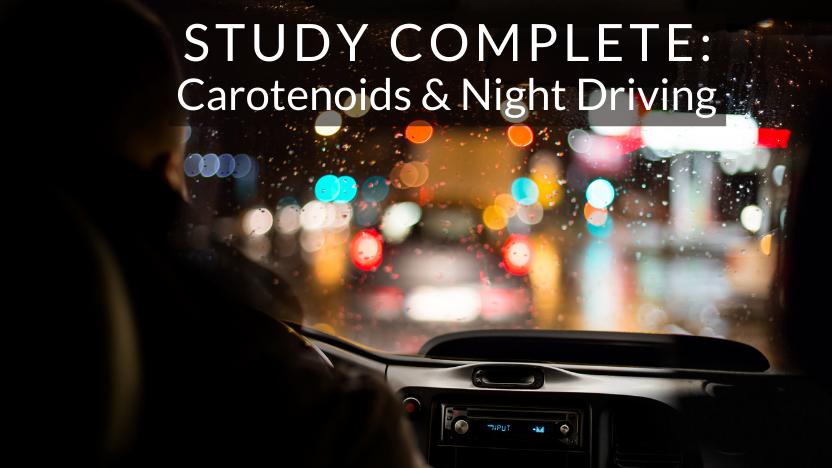STUDY COMPLETE: Carotenoids Linked to Night Driving Improvements
Posted by EyePromise on Feb 10th 2022
When it comes to low vision, one of the first abilities affected is night driving. Night driving is a common anxiety for many people, even people who are relatively young and healthy. However, a recent study demonstrated that night driving ability can be improved through nutrition, specifically supplementation.
Vision-Related Night Driving Difficulties
Night driving has many external factors that can complicate vision. The most common complaints from having difficulty with driving at night include:

- Low light: Obviously, there is less light available while driving at night. However, for some people, even the most well-lit streets can be difficult to navigate. This low-light environment is part of the reason people have less confidence while driving at night.
- Light sensitivity: Because there is little light to begin with, your eyes do their best to adjust to these circumstances. Therefore, when you finally find a well-lit area, you may experience some light sensitivity. Light sensitivity is when your eyes feel strained or even painful after transitioning from a darker environment to a brighter environment.
- Glare recovery: Unlike light sensitivity, glare recovery has little to do with the environmental lighting. It is the time it takes your eyes to “see normally” after experiencing a bright light, like those of passing headlights. For most people, your eyes return in about 1-2 seconds. For those struggling with night driving, it can be much longer and much scarier.
- Contrast: Contrast sensitivity is another visual function that can be dependent on lighting in the environment, but it can be lacking even in the best of lighting. Contrast sensitivity is the ability to distinguish objects from other objects or their backgrounds of similar colors and shades. For example, quickly identifying a black cat crossing a dark street.
Each of these visual functions are connected to a protective pigment deep in the retina called macular pigment. The healthier, or denser, your macular pigment, the better your eyes can perform these functions. Clinical trials have objectively proven that nutritional supplementation can increase macular pigment optical density (MPOD), but these researchers wanted to know if that translated to improved night driving.
The Study

The study titled “Night Vision and Carotenoids (NVC): A Randomized Placebo Controlled Clinical Trial on Effects of Carotenoid Supplementation on Night Vision in Older Adults” aimed to evaluate changes in functional night vision and field of view (UFOV) in participants supplementing with dietary zeaxanthin and lutein for 6 months compared to a placebo. The study was conducted as a prospective, randomized, double-blind clinical trial. The active group received a supplement containing 14mg zeaxanthin and 7mg lutein.
Results
The active group (the group receiving supplementation) improved over the placebo group, whose results remained the same as baseline. MPOD increased in both eyes in the active group, and they showed significant improvements in contrast sensitivity with glare and LogMAR acuity scores. Glare recovery time decreased, along with the light preference required for participants to complete visual tasks. To put all these tests into relevant data for drivers, researchers also recorded UFOV scores of divided attention and composite crash risk scores, which both improved.
What Does This Mean?
The clinical researchers stated that “augmenting MPOD in individuals with difficulty in night vision showed measurable benefits in numerous visual functions that are important for night vision driving.” These measurable benefits included objective and subjective testing and correlated to real-life improvements in the participants’ ability to drive at night.
The supplement given to participants was EyePromise Screen Shield Pro, which is a one-a-day softgel that delivers the 2:1 ratio of dietary zeaxanthin to lutein plus other eye-healthy ingredients like Omega-3s, Vitamin D, and bilberry extract. Learn more about this innovative formula.

